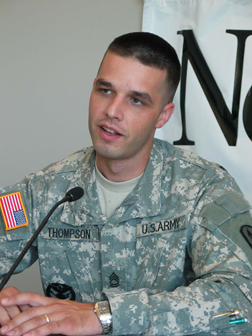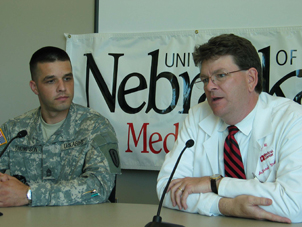 |
Mark Thompson |
Thompson, 29, should know.
In 2000, he was diagnosed with Type I (insulin dependent) diabetes. He had his sights on being a career soldier in the U.S. Army, but the diagnosis of diabetes could have easily ended his military career.
Thompson had other ideas, and – thanks to taking control of his disease – he was able to convince the Army to let him continue in the service. Better yet, he was able to prove to the Army that he could follow his unit to Iraq in 2004 and be a part of their combat mission – a rarity for any soldier with Type I diabetes.
Thompson, who has risen to the rank of Sgt. 1st Class, is a native of Conesville, Iowa, which is about 35 miles south of Iowa City. He came to Omaha as the keynote speaker at the American Diabetes Association’s Annual Gala on May 12 at the downtown Embassy Suites. He also participated in a news conference at UNMC earlier that day.
“When they said, ‘OK, you have diabetes,’ I was waiting to hear the treatment method – penicillin, Motrin,” he said. “Then, I learned it is a lifelong condition. It was depressing at first.”
 |
Mark Thompson, left, and UNMC’s James Lane, M.D. |
The first year after he was diagnosed, he graduated at the top of his class in physical fitness assessment and was able to convince the division surgeon that he was fit to join his unit in Iraq. In March 2004, he left for a one-year tour of duty with the understanding that if his glucose levels varied too much, the Army would put him on the next plane back to Germany.
It was far from perfect sailing. Thompson’s insulin pump stopped working at one point, forcing him to resort to insulin shots for several weeks until a new insulin pump arrived.
Thompson, who takes his blood sugar levels eight times a day, returned from Iraq to become a career counselor at Fort Jackson Soldier Support Institute in Columbia, S.C. In this role, he helps soldiers choose career paths within the Army. Eventually, he hopes to pursue a nursing career and become a certified diabetes educator.
He looks back on his combat mission with great satisfaction. “I was able to prove that this disease was not going to stop me from doing anything,” he said.
James Lane, M.D., associate professor, internal medicine, section of diabetes, endocrinology & metabolism, agrees with Thompson. “If you have diabetes, that should not be a limitation in your life,” he said. “Learning how to manage the disease is the key.” Dr. Lane introduced Thompson at the news conference.
At the May 12 American Diabetes Association’s gala, Margaret Bumann of UNMC public affairs served as emcee. In addition, Sam Cohen, M.D., Ph.D., professor and chairman of the department of pathology and microbiology, and his wife, Jan, received an award from the asociation for the couple’s efforts in fighting diabetes through research and fundraising. Jan Cohen is a diabetic.